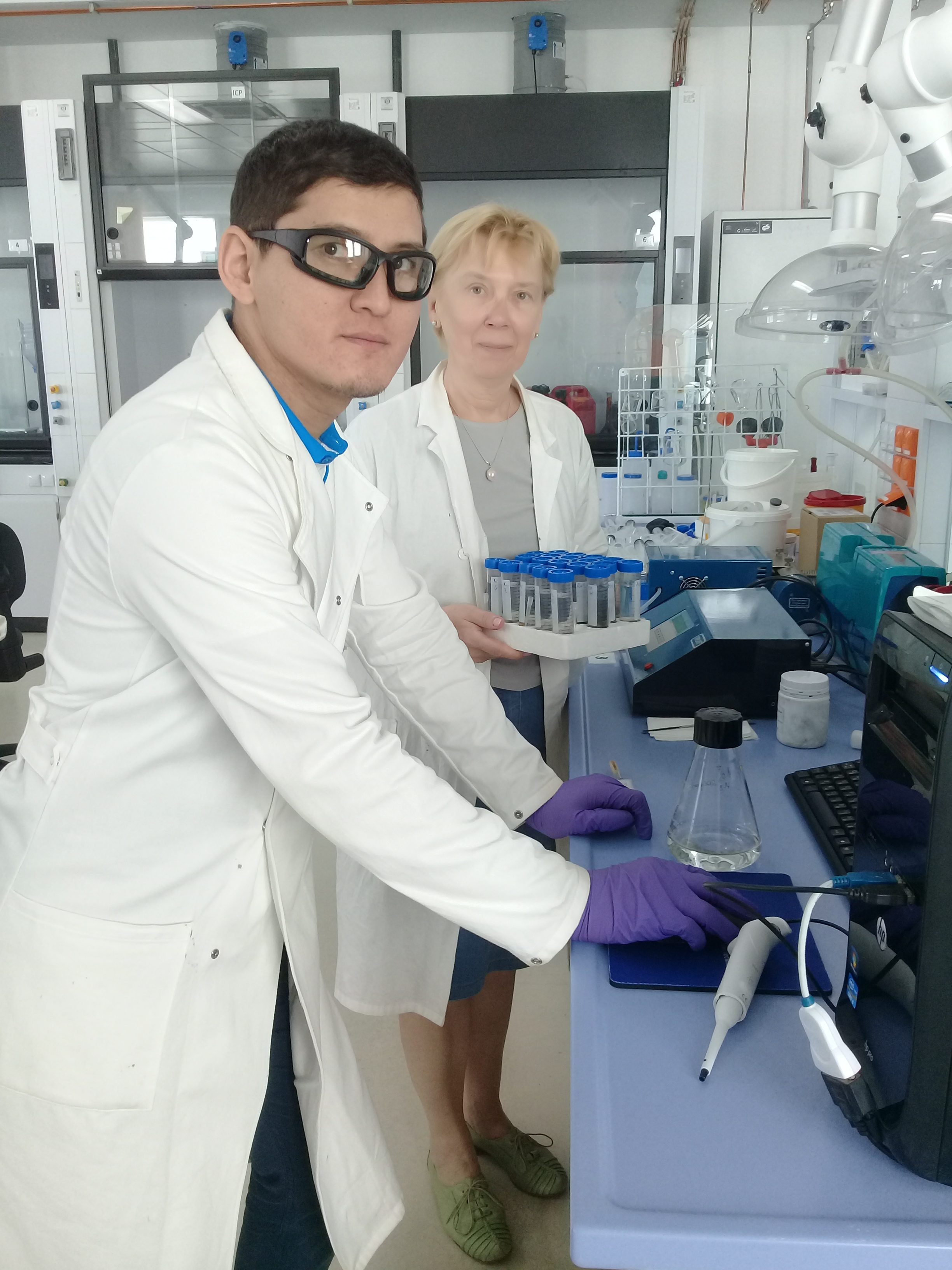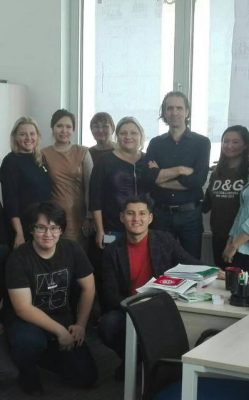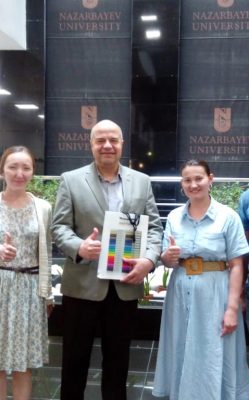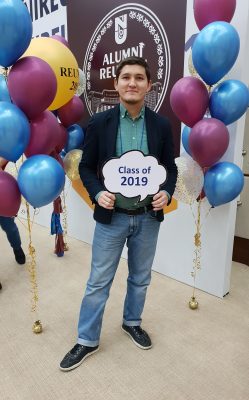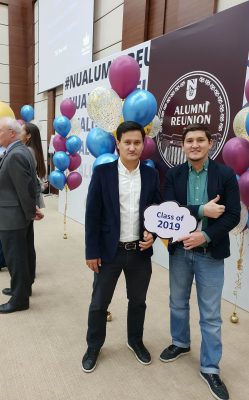NU doctoral student offers solutions to wastewater treatment problems
Today we are talking with Zhandos Tauanov, Ph.D. in Science, Engineering and Technology, School of Engineering and Digital Sciences graduate.
- Tell us about your research. What is the main field of your study?
My thesis topic centered on how wastewater could be purified by using fly ash derived zeolites and nanocomposites to remove mercury and iodide. This research topic was initially suggested by Grigorios Itskos, Professor of Mechanical Engineering. I began active work on my dissertation project in October 2015. Zeolites, 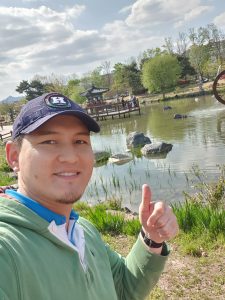 nanocomposites, and silver were obtained from coal fly ash and used in wastewater treatment. Our coal fly ash was supplied by the heating plants of Nur-Sultan and Ust-Kamenogorsk, where coal is used to generate electricity.
nanocomposites, and silver were obtained from coal fly ash and used in wastewater treatment. Our coal fly ash was supplied by the heating plants of Nur-Sultan and Ust-Kamenogorsk, where coal is used to generate electricity.
Unfortunately, at the end of that December, Professor Grigoris Itskos left NU to work at an American university, but thankfully, he remained my external supervisor. I continued my research with Professors Vasileios Inglezakis and Dhawal Shah. These professors helped me considerably and their supervision and guidance made the project possible. They helped with all aspects of the project – theoretical and applied – for example, performing simulations, modeling, and laboratory experiments. So, this year, together with my supervisors, I published two articles in reputable journals that are included in the Q1 and Q2 ratings.
I am currently working in a postdoctoral program in Korea. This agreement was made possible with the help of Professor Jaebeom Lee, who visited NU in 2019. Although his field of work –biomedical engineering – was something fundamentally new to me, I was interested in his research. I told the professor about my interest in the project, sent him my CV, and three months later he helped me to write an application for a Korea Research Fellowship. In September, I received an invitation to a postdoctoral program, and at the end of November, my family and I left for work at Chungnam National University. But before that, immediately after my thesis defense, I took part in a month-long internship in Hungary, at the University of Budapest. To this day, I keep in touch with Hungarian researchers. We are now writing an article related to the topic of my research.
- What about the applied component of your research? Are there any results or are they expected in the near future?
I would say that my research is, in fact, of a fundamentally applied nature. We paid primary attention to studying the fundamental part: the structure of the material, its interaction with pollutants, the mechanism of their removal, and modeling. In practical terms, the project can be used by environmentalists for wastewater treatment. If it is found that the material performs well on a small scale in the removal of inorganic ions, then its use can be scaled up for industrial level use in metallurgy. Currently, we have carried out a series of experiments in laboratory conditions, we need to increase the scale to semi-industrial conditions in order to study the material and select the optimal parameters for pollutants removal. We plan to do this in the future, but at this stage, we are still learning the fundamental part: improving and optimizing our material.
- What do you think is important when working on a dissertation? What helped you in your research?
The process of doing a Ph.D. research is not easy. After admission, one may think that there are 3-4 years ahead and they can do everything, but once you start your research, you realize that nothing is as easy as it seemed at first glance. Unfortunately, not all experiments have a positive outcome. For example, out of 100 experiments, only 2 or 3 can be successful, and you need to work on this further, optimizing the results in order to get something in the end. In addition, publications in international peer-reviewed journals are required for a Ph.D. degree, meaning your article must be reviewed and commented upon by at least three independent reviewers.
Moreover, research projects should have value. An ideal project should be innovative and generate new knowledge that has both fundamental and applied components. In other words, it is important to have something new to say about the topic in your research area. Moreover, a researcher must learn how to correctly present study results to the scientific community, especially the reviewers and the editors of journals. You need a serious commitment to the project and perseverance. If from the start of the process, you show dedication then good results are almost guaranteed. During my dissertation work, I published four papers in reputable journals (three in Q1 and one in Q2 categories). After the defense, I published another article – a literature review and a “study” on the results of my experiments. I am very proud of the results of my work, and that I was able to share them in various publications.
As mentioned above, I had very good supervisors who made this work possible. My supervisors provided balance in advising and helping the project, in some ways they were like yin and yang. Vasileios was strict and demanding, and Dhawal was kind and gentle. Because my research had a heavy experimental component, I primarily worked with Vasileios. He supervised my experiments and research, and we often debated. As for Dhawal, he shared a lot of advice about the project and specifically helped me to write manuscripts and navigate the publication process.
The laboratory equipment at NU is very good, and this provides great opportunities for research. In addition, studying at NU means participating in international conferences and seminars. So, during my studies, I attended a conference in Barcelona and a seminar on water issues in Greece, after which I published my thesis articles. In general, according to the requirements of the Ph.D. program, two articles need to be published, and I have published seven in total.
Finally, family support is the most important and necessary condition for the successful completion of the work. My family and friends supported me a lot. I became a father in 2018, and this was not easy for me. When you have a family, a small child, and, at the same time, you need to study, to do your research, it is never easy. But my wife and my parents have always been there for me.
- Can you please tell us about your further plans?
Although I work in Korea, I am now applying for grants in Kazakhstan. I am proceeding with my research, in the future, we plan to include new materials with magnetic properties in our project. Earlier in the project, we studied water purification using zeolites and nanocomposites, now we want to study this process using materials with magnetic properties since the action of a permanent magnet will facilitate the process of material regeneration after wastewater treatment. For this project, we have already submitted a grant application to the Ministry of Education and Science of the Republic of Kazakhstan. I applied for another grant on a similar topic. This application proposes to study the possibility of removing pharmaceutical and medicinal pollutants, which is a growing concern for today’s wastewater. This is a fairly new area of study as scientists only started researching it 5-10 years ago.
Professional networking is very important for acquiring new knowledge and establishing good relationships with interesting people. For example, at one of the events, a workshop called “Water Pollution and Climate Change Workshop” organized by the University of Durham (UK) and the Climate Change Coordination Center (Kazakhstan), I met Anna Bogush, a professor at Coventry University. After I defended my thesis, she invited me to apply for the Newton International Fellowship of Royal Society. This year we wrote and submitted a project proposal. We are waiting for the results of our application. My current fellowship in Korea is scheduled to end in late November. After its conclusion, I hope to work in the UK for a year, and, at the same time, lead my projects in Kazakhstan.
What would you recommend to future doctoral students and scholars?
For future doctoral students, I would recommend starting research during their masters studies, or even earlier – in the last year of their bachelor’s program. If this is an experimental study, then, all the more, you need to start it ahead of time: study the laboratory, equipment, and how to work with it. If there is a need for computer modeling, then, again, you need to start your research in advance. The second point is that you need to read very good scientific journals: Nature, Science, and so on. By studying them, you can find niche areas, as well as promising and relevant topics for future research.
When choosing a project supervisor, I would advise you to pay attention to how active he or she is, and also to look for someone with similar research interests. Some important things to pay attention to are what the professor studies, what publications he or she has, and where these articles are published. Most importantly, you need to honestly consider if you are interested in this field of study. If not, then you need to look for another professor. You can additionally establish contacts with international experts who work in the field of your research. At the same time, try to find common issues that can be researched together, as well as apply for international grants. For example, in the UK, there are many grants under which you can travel to the country for a certain period and conduct research together with international scientists.
If the research is of an experimental nature, then it is necessary to make sure it is feasible. You need to consider the availability of a laboratory and technical base, the need to purchase materials, tools, reagents, etc. Sometimes it can be challenging in Kazakhstan. Orders arrive 3, 6, or even 9 months later. Therefore, I would advise trying to troubleshoot such problems ahead of time. If possible, order everything you need in advance, or design a project that can be done with already available reagents and instruments. You can also take advantage of opportunities that emerge from formal agreements or other cooperative frameworks between universities and research institutes. It may be possible to carry out joint work with such partners.
In general, studying for a Ph.D. program is psychologically and morally challenging. Unfortunately, not everyone succeeds in doing a Ph.D. This is possible only for those who, despite the difficulties, consistently move forward, show perseverance, and work hard.



